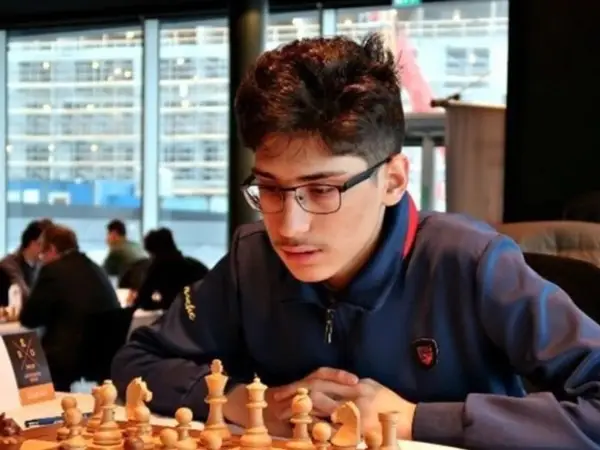Alireza Firouzja, the 18-year-old chess player who left the Iran team in 2019 due to a ban on competing with Israelis, has won a top international award.
Voters on Chess.com, an internet server, news and networking website with 77 million global users, chose him as the ‘Rising Star’ of 2021, and ranked him second as ‘Player of the Year.’ Firouzja’s game against Hungarian grandmaster Richard Rapport was judged the third best game of 2021.
Magnus Carlsen, the 31-year-old world chess champion, was voted Player of the Year. In December, Carlsen in a blog post wrote he was unlikely to play another match defending his title unless against someone from the “next generation,” which was taken to mean Firouzja, second in world rankings.
Firouzja won the Iranian championship aged 12 and was a grandmaster at 14. He is the second-youngest player ever to reach a rating of 2700, which he did at 16. In December 2019 Firouzja became the first-ever Iranian male chess player to come second in the World Rapid Chess Championship in Moscow.
Firouzja renounced his Iranian citizenship in 2019 over pressure to forfeit matches with Israeli competitors, and now competes as a French citizen at international tournaments.
Iran is among states that do not recognize the state of Israel, a refusal that goes back to the pronouncement by 1979 Revolution leader Ruhollah Khomeini that Iran could have formal relations with any state in the world other than Israel or apartheid South Africa. Tehran prohibits sportspeople from playing against Israeli competitors or pressures them to intentionally lose games so as to avoid competing with Israelis.
Ali Khamenei, Iran’s supreme leader, has often praised Iranian athletes who refuse to play against Israelis, and in September 2021 said they should continue to do so even if facing punishment by international sports bodies.
In November 2020, vice-President of the International Chess Federation Nigel Short warned Iran's Chess Federation that it could be banned from international events if Iranians were not allowed to compete against Israelis.
There have been other sporting and cultural boycotts of Israel in recent years. In 2018 Argentinian soccer players including Lionel Messi refused to play a friendly game in Jerusalem because the ground was on the site of a razed Palestinian village. This week, more than 20 acts withdrew from the Sydney Festival because of Israeli funding. But the Islamic Republic’s ideological basis for its boycott is much more radical. Iranian officials have often called for Israel’s destruction and are supplying arms and money to militant groups.
Among dozens of Iranian athletes who have emigrated over the past two decades, some said they did so because officials forced them to lose titles by refusing to compete against Israelis.
The internationally renowned chess player Ghazal Hakimifard gave up Iranian nationality in 2020 in protest and plays for Switzerland.
Some female athletes say they have left the national team because of mandatory hijab (dress code). Grandmaster Mitra Hejazipour was expelled from the chess team for removing her headscarf during international tournaments.
